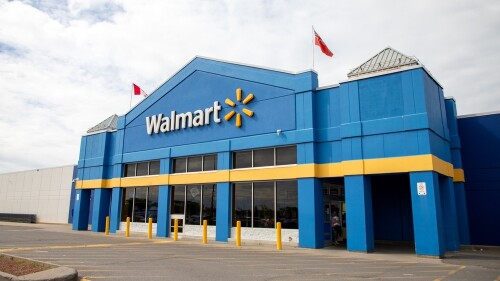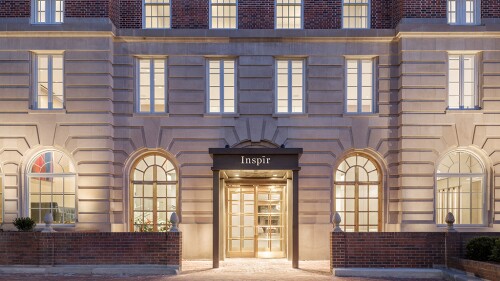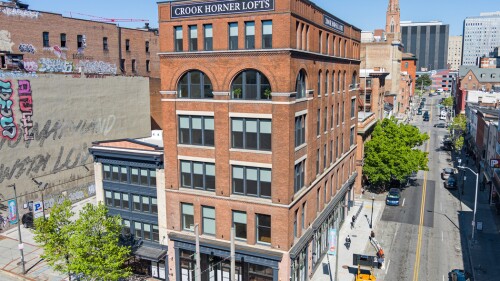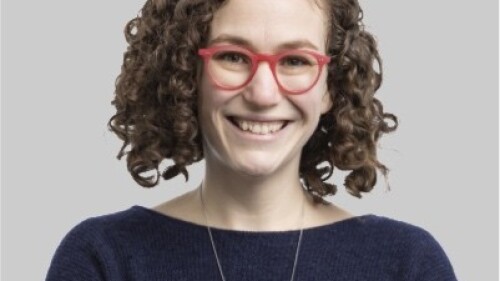Jay Bailey, president and chief executive officer of the Atlanta-based Russell Innovation Center for Entrepreneurs, or RICE, is committed to championing Black entrepreneurs and creating unparalleled opportunities. Since he took the helm at RICE, Bailey has worked to create growth experiences for business owners and forge corporate relationships. Located at the former headquarters of H.J. Russell & Company, RICE supports 305 entrepreneurs full time and “sees or touches” 10,000 annually, he says.
Urban Land recently interviewed Bailey on the subject of how commercial real estate can be used to help close the racial wealth gap.
UL: Why were you interested in leading the Russell Innovation Center for Entrepreneurs?
Jay Bailey: There are very few times in life when you get to be a part of something you know will outlast you. There are even rarer moments where you get to be a part of something that could potentially change the course of history. Herman Russell was, arguably, one of the most prolific entrepreneurs that this city has ever produced and having the opportunity to carry his legacy forward, to find the next H.J. Russell and inspire and develop and support the growth of an entrepreneur that may change the city in different ways was just too big a thing to say no to. So when I started, we started at zero. The family was generous to donate the former headquarters building of H.J. Russell & Co., but we started with a zero budget, a gutted-out building, and just a whole lot of vision.
UL: How do you think real estate can be used to help close the racial wealth gap?
Bailey: Black people in America own less than 2 percent of the dirt in the entire United States. When you account for urban sprawl, development—even agricultural opportunities—I think that all wealth comes from the dirt. How can we ever talk about a comprehensive wealth gap strategy if Black people don’t have a seat at the table with ownership, and what’s traditionally been the most historic foundational construct of wealth building in the history of man, which is land and real estate.
From a commercial aspect where we’re looking at opportunities for urban sprawl and appreciation, from an agriculture standpoint and looking from a land perspective, the metro Atlanta area has been growing consistently for the past 30 years. Areas that were once considered very rural, like Conyers, Georgia, are now considered metro Atlanta. I think that all of that goes along with this urban land, and how do we define urban land as continually expanding as population density goes up.
UL: What partnerships does RICE have?
Bailey: We have a partnership with 68 different companies. We’ve raised a little north of $49 million in the past four years, and it comes from companies like [J.P. Morgan] Chase. It comes from companies like UPS [United Parcel Service]. It comes from companies like Fiserv, so we’ve done a very good job of bringing the corporate superpowers to the table because they create opportunity for small business owners. When you’ve got a small business owner that can do business with a Walt Disney World and its organization or UPS, you accelerate the time it takes to develop the kind of relationship to secure contracts. We accelerate that by 1,000 percent by having these partners in the house.
It usually takes a small business about six years to cultivate, develop, and secure a contract with a Fortune 500. In one particular case, we were able to do it in six months. As we start talking about closing the wealth gap, I think it’s all rooted in access, opportunity, and exposure. Making sure the companies have not only the access to the capital, but the access to the networks, the access to the training and development and the mentorship and the coaching, the access to the contracts and the companies that can help them grow and scale. Partnerships with Fortune 1000 companies play a tremendous role in creating opportunities for small businesses to grow, to develop, to create jobs, but ultimately create more wealth. We’ve created the largest center in America doing this work, and it’s rooted in real estate in honor of arguably one of the greatest real estate entrepreneurs Atlanta has ever produced.
UL: How do businesses get involved with RICE?
Bailey: Each business applies, and all are metro Atlanta–based for right now. We have an info session where we outline who we are and who we’re not. Those that are able to attend the info session get invited to apply. Based on that application, you’re placed, and so it’s not just the best businesses get in; no, it’s just about the businesses that we’re best equipped to serve at this time. We’ll grow to serving 1,000 entrepreneurs full time within the next two to three years, and we have a waiting list of over 500 currently.
UL: What else makes RICE unique from other business generators?
Bailey: Our methodology is different, the way that we approach growth and development through our Big Ideas Model. We meet entrepreneurs where they are and create action plans to get them where they want to go, but also we have a fierce intentionality about how we spend our money. We spend more with Black companies than many Fortune 1000 companies, and when people visit the Russell Center, they’ll see from the general contractor to the architect to the guy that does our pest control, janitorial, snacks that we eat, the water that we drink, all of that is done by Black businesses that are within our stakeholder network. That fierce intentionality that we use is what we also share with our corporations. If we as a four-year-old nonprofit organization are spending more with Black businesses than you as a Fortune 1000, we know that together more can be done if we move with intentionality.
More on This Topic:






